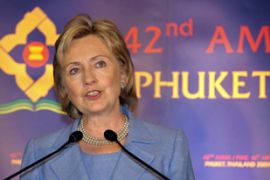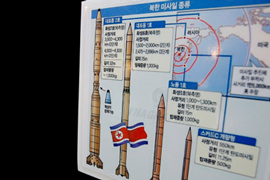‘Stark choice’ for North Korea
US secretary of state says N Korea faces further isolation over its nuclear programme.

| In depth |
|
Videos |
“Our approach isolates North Korea, imposes meaningful pressure to force changes in its behaviour, and provides an alternative path that would serve everyone’s interests,” she will tell the meeting.
In return for North Korea’s “full and verifiable denuclearisation” Clinton will say the US is prepared to offer “significant energy and economic assistance”.
North Korea tested a second nuclear device in May and has also conducted a series of missile launches, ramping up tensions on the Korean peninsula.
Following the nuclear test, the United Nations announced a toughening of sanctions against North Korea, triggering an angry response from Pyongyang which said it was abandoning disarmament moves and would restart work on what it calls its nuclear deterrent.
Military ties
Clinton’s comments come after she raised concerns at growing ties between North Korea and military-ruled Myanmar, including the possible transfer of nuclear technology.
She said growing military ties between the two countries had the potential to threaten regional stability.
Diplomats from North Korea and Myanmar, a member of the 10-nation Asean regional bloc, are also attending the ARF meeting in Phuket, although Clinton has ruled out any direct meetings with them.
|
“Complete and irreversible de-nuclearisation is the only viable path for North Korea” Hillary Clinton, |
On Wednesday, Clinton said her counterparts from Japan, Russia, China and South Korea – all parties to the six-party talks on North Korea – had agreed on the need to enforce still tighter sanctions if Pyongyang refuses to take key steps.
Those include dismantling the North dismantling its nuclear reactor at Yongbyon and giving up its plutonium stockpile.
“All four of the other foreign ministers agreed that full implementation is important to demonstrate unanimity and resolve in the face of North Korean provocations and to make clear that complete and irreversible de-nuclearisation is the only viable path for North Korea,” Clinton told reporters.
‘Difficulties’
China, which has hosted the six-nation talks and is North Korea’s biggest supplier of aid, said it was in close touch with all parties and it was important to take a long-term view of the disarmament process.
“Although the talks have come across some difficulties, one must not ignore the fact that major progress was acheived some time ago,” said Yang Jiechi, the Chinese foreign minister.
 |
| The US senate is considering moves to put North Korea back on its terror blacklist [AP] |
“So one should take a long term point of view and work for the resumption of the six party talks.”
In April North Korea said it was scrapping all agreements made under the six-party talks following a UN Security Council rebuke over its test of a long-range missile.
The North then resumed weapons testing and its subsequent nuclear test triggered a Security Council resolution for increased inspections of shipments going to and from the country as well as an expanded arms embargo.
On Wednesday, the US Senate called North Korea a “threat” to its neighbours and pushed for a formal review to see whether the Obama administration should return it to a US terrorism blacklist.
The previous US administration removed North Korea from the list in October 2008 as part of Washington’s stop-start diplomacy with the country.

